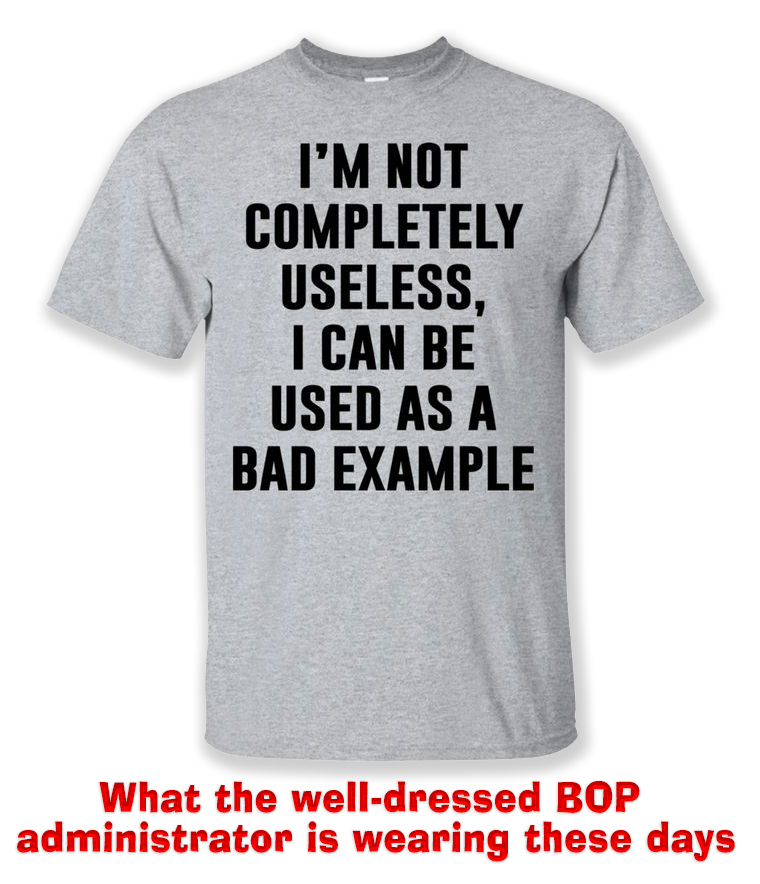Turkeys Pardoned While 18,000 Wait – Update for November 21, 2023
We post news and comment on federal criminal justice issues, focused primarily on trial and post-conviction matters, legislative initiatives, and sentencing issues.

BIDEN GRANTS PARDONS – BUT JUST FOR SOME TURKEYS
President Biden bettered his dismal record on granting pardons and commutations yesterday. Unfortunately, the gobbling recipients are not in BOP custody.
 Two Minnesota turkeys, Liberty and Bell, arrived at the White House in a stretch Cadillac Escalade to receive a pardon from the President in the annual darkly humorous (except to the incarcerated and their families) White House Thanksgiving ceremony. The Washington Post calls a “hollow tradition.”
Two Minnesota turkeys, Liberty and Bell, arrived at the White House in a stretch Cadillac Escalade to receive a pardon from the President in the annual darkly humorous (except to the incarcerated and their families) White House Thanksgiving ceremony. The Washington Post calls a “hollow tradition.”
Although Biden branded it “the biggest edition of this wonderful White House Thanksgiving tradition,” the Post said the “event felt exceedingly breezy and unmemorable — even by turkey-pardon standards.”
The birds hatched in July on a farm near Willmar. Within 150 miles of the farm are nearly 1,500 men and women in BOP facilities, none of whom received pardons or commutations yesterday. Over 18,000 clemency applications are on file at the DOJ (not including the two for the turkeys).
 Last week, Pardon Attorney Elizabeth Oyer visited FCI Petersburg to provide a series of educational sessions about the federal clemency process. Given the 18,000-application backlog and low number of Biden pardons and commutations granted almost three years into his term, the purpose of the Pardon Attorney’s “initiatives” is unclear. The Pardon Attorney said the visit and prior sessions at Ft Dix, Lewisburg and Aliceville are part of a year-round initiative by her Office “to increase the accessibility and transparency of the clemency process through education and community engagement.”
Last week, Pardon Attorney Elizabeth Oyer visited FCI Petersburg to provide a series of educational sessions about the federal clemency process. Given the 18,000-application backlog and low number of Biden pardons and commutations granted almost three years into his term, the purpose of the Pardon Attorney’s “initiatives” is unclear. The Pardon Attorney said the visit and prior sessions at Ft Dix, Lewisburg and Aliceville are part of a year-round initiative by her Office “to increase the accessibility and transparency of the clemency process through education and community engagement.”
Better gobbledygook couldn’t have emanated from the happy birds, Liberty & Bell. And they should be happy. Today, without even asking for it, they got something over 18,000 federal prisoners have asked for but not gotten: clemency.
MPR News, Minnesota turkeys headed to White House for presidential pardon (November 17, 2023)
Washington Post, Biden turns 81, pardons turkeys, confuses Britney for Taylor (November 20, 2023)
Prison Policy Initiative, Executive inaction: States and the federal government fail to use commutations as a release mechanism (April 2022)
Dept of Justice Press Release, Readout of Pardon Attorney Elizabeth Oyer’s Visit to Federal Correctional Institution Petersburg (November 15, 2023)
– Thomas L. Root

Two District Courts Find Felon-in-Possession Unconstitutional – Update for November 20, 2023
We post news and comment on federal criminal justice issues, focused primarily on trial and post-conviction matters, legislative initiatives, and sentencing issues.

RUMBLINGS OF 922(g) UNCONSTITUTIONALITY
 Even while the Supreme Court ponders Rahimi – the case that questions whether prohibiting people subject to domestic protection orders from having guns – lower courts are expressing doubts about whether 18 USC § 922(g), the statute prohibiting felons from possessing firearms, remains constitutional after the Supreme Court’s 2022 New York State Rifle & Pistol Assn v. Bruen decision.
Even while the Supreme Court ponders Rahimi – the case that questions whether prohibiting people subject to domestic protection orders from having guns – lower courts are expressing doubts about whether 18 USC § 922(g), the statute prohibiting felons from possessing firearms, remains constitutional after the Supreme Court’s 2022 New York State Rifle & Pistol Assn v. Bruen decision.
The leading decision against unconstitutionality, of course, is Range v. Atty General, a 3rd Circuit en banc decision last June. Range held that § 922(g)(1) was unconstitutional as applied to Bryan Range, who had been convicted of a welfare fraud offense 25 years ago. The government has filed for Supreme Court review in Range and asked SCOTUS to sit on the petition until it decides Rahimi next spring.
At the same time, the 8th Circuit went the other way in United States v. Jackson.
Down in the trenches, however, two federal district courts have held in the last several weeks that the felon-in-possession statute is unconstitutional.
In Chicago, Glen Prince – who the Government said had been robbing people at gunpoint on commuter trains – was arrested late one night while standing on a train platform with a gun. Ten days ago, a district court threw out his pending 18 USC § 922(g)(1) indictment – which alleged that Glen was Armed Career Criminal Act-eligible – as unconstitutional under Bruen.
The court ruled that Bruen did not hold that the Second Amendment categorically protects only law-abiding citizens, despite repeated use of such qualified language as “law-abiding citizens” in the decision. The district judge concluded instead that “the government has not met its burden to prove that felons are excluded from ‘the people’ whose firearm possession is presumptively protected by the plain text of the Second Amendment.
 Because the right of a person with a prior felony conviction to possess a gun is presumptively protected by that Amendment, the court said, Bruen gives the government the authority to prohibit possession only when it can “demonstrate that the statute is part of this nation’s historical tradition of firearm regulation… Where a ‘distinctly modern’ regulation is at issue, the government must offer a historical regulation that is ‘relevantly similar’ and… must determine whether historical regulations ‘impose a comparable burden on the right of armed self-defense and whether that burden is comparably justified’ as the burden imposed by § 922(g)(1).”
Because the right of a person with a prior felony conviction to possess a gun is presumptively protected by that Amendment, the court said, Bruen gives the government the authority to prohibit possession only when it can “demonstrate that the statute is part of this nation’s historical tradition of firearm regulation… Where a ‘distinctly modern’ regulation is at issue, the government must offer a historical regulation that is ‘relevantly similar’ and… must determine whether historical regulations ‘impose a comparable burden on the right of armed self-defense and whether that burden is comparably justified’ as the burden imposed by § 922(g)(1).”
The “first federal statute disqualifying certain violent felons from firearm possession was not enacted until… 1938,” the court noted, finding “no evidence of any law categorically restricting individuals with felony convictions from possessing firearms at the time of the Founding or ratification of the Second or 14th Amendments.” The district court concluded that § 922(g)(1) “imposes a far greater burden on the right to keep and bear arms than the historical categorical exclusions from the people’s Second Amendment right. The government has not demonstrated why the modern ubiquity of gun violence, and the heightened lethality of today’s firearm technology compared to the Founding, justify a different result.”
Glen’s ACCA count was dismissed.
Meanwhile, in the Eastern District of Pennsylvania, a district court declared § 922(g) unconstitutional as applied to a man convicted of a DUI two decades ago.
Ed Williams had a prior drunk-driving conviction when he was arrested for DUI in Philadelphia 20 years ago. The prior conviction, combined with the fact that his blood alcohol concentration was three times the legal limit, made the second offense “a 1st-degree misdemeanor punishable by up to 5 years in prison.” That was enough to trigger § 922(g)(1), which prohibits guns to anyone convicted of a crime carrying a maximum sentence of over a year in prison (not just felonies).
 The district court ruled that “[p]rohibiting [Ed]’s possession of a firearm due to his DUI conviction is a violation of his Second Amendment rights as it is inconsistent with the United States’ tradition of firearms regulation. The Constitution ‘presumptively protects’ individual conduct plainly covered by the text of the Second Amendment, which includes an individual’s right to keep and bear arms for self-defense… Protected individuals presumptively include all Americans… The Supreme Court has held that an individual’s conduct may fall outside of Second Amendment protection ‘[o]nly if a firearm regulation is consistent with this Nation’s historical tradition…’”
The district court ruled that “[p]rohibiting [Ed]’s possession of a firearm due to his DUI conviction is a violation of his Second Amendment rights as it is inconsistent with the United States’ tradition of firearms regulation. The Constitution ‘presumptively protects’ individual conduct plainly covered by the text of the Second Amendment, which includes an individual’s right to keep and bear arms for self-defense… Protected individuals presumptively include all Americans… The Supreme Court has held that an individual’s conduct may fall outside of Second Amendment protection ‘[o]nly if a firearm regulation is consistent with this Nation’s historical tradition…’”
The district court relied on the fact that the 3rd Circuit had “determined that Bryan Range, who had a qualifying conviction under Section 922(g)(1) for making a false statement to obtain food stamps and who wished to possess firearms to hunt and to defend himself, could not be denied his 2nd Amendment right to possess a firearm due to that conviction.” The judge held that “the narrow analysis in Range also applies to the Plaintiff here.”
United States v. Prince, Case No. 22-CR-240, 2023 U.S. Dist. LEXIS 196874 (N.D. Ill., November 2, 2023)
Williams v. Garland, Case No. 17-cv-2641, 2023 U.S. Dist. LEXIS 203304 (E.D.Pa., November 14, 2023)
WLS-TV, Chicago judge rules statute barring felons from having guns unconstitutional under Bruen decision (November 16, 2023)
Reason, He Lost His Gun Rights Because of a Misdemeanor DUI Conviction. That Was Unconstitutional, a Judge Says (November 15, 2023)
– Thomas L. Root

Government Joins Petitioner In Urging SCOTUS ACCA Review – Update for November 17, 2023
We post news and comment on federal criminal justice issues, focused primarily on trial and post-conviction matters, legislative initiatives, and sentencing issues.

GOVERNMENT SUPPORTS SCOTUS REVIEW OF ARMED CAREER CRIMINAL ACT ISSUE

The Armed Career Criminal Act provides that if convicted felons who possess firearms in violation of 18 USC § 922(g)(1) have three prior convictions for serious drug offenses or crimes of violence (or a mix of the two), they are subject to a 15-year-to-life sentence, with 15 years being the mandatory minimum. The ACCA statute, 18 USC § 924(e)(2), can only be applied if the defendant has committed the three predicate offenses on different occasions.
Up to now, circuits have been split on whether a judge or a jury had to find that the three occasions were different. Recently, a Supreme Court opinion, Wooden v. United States, established standards for deciding when offenses had been committed on “different occasions.” Now, a pending petition for certiorari asks the Supreme Court to determine whether the Sixth Amendment requires a jury to find (or a defendant to admit) that the occasions really were different.
Surprisingly, the government agrees with the defendant that SCOTUS should hear the case:
Petitioner renews his contention that the 6th Amendment requires a jury to find (or a defendant to admit) that predicate offenses were under the ACCA. In light of this Court’s recent articulation of the standard for determining whether offenses occurred on different occasions in Wooden v United States, the government agrees with that contention. Although the government has opposed previous petitions raising this issue, recent developments make clear that this Court’s intervention is necessary to ensure that the circuits correctly recognize defendants’ constitutional rights in this context. This case presents a suitable vehicle for deciding the issue this Term and thereby providing the timely guidance that the issue requires.
The Supreme Court considered the petition at its November 9th conference but relisted it for today’s conference. We could know Monday, but there is a decent chance that it will be relisted again.
 Ohio State University law professor Doug Berman, writing in his Sentencing Law and Policy blog, observed that Justice Clarence Thomas “has suggested that he disagrees with the entire prior-conviction exception to Sixth Amendment rights.” In the 1998 Almendarez-Torres v. United States decision, the Supremes held that a court need not have proof beyond a reasonable doubt of prior convictions. Berman suggests that Erlinger could provide the Supreme Court “an opportunity to reconsider that (historically suspect) exception altogether.”
Ohio State University law professor Doug Berman, writing in his Sentencing Law and Policy blog, observed that Justice Clarence Thomas “has suggested that he disagrees with the entire prior-conviction exception to Sixth Amendment rights.” In the 1998 Almendarez-Torres v. United States decision, the Supremes held that a court need not have proof beyond a reasonable doubt of prior convictions. Berman suggests that Erlinger could provide the Supreme Court “an opportunity to reconsider that (historically suspect) exception altogether.”
Brief for Government, Erlinger v. United States, Case No 23-370 (October 17, 2023)
Wooden v. United States, 595 U.S. 360, 142 S. Ct. 1063, 1065 (2022)
Almendarez-Torres v. United States, 523 US 224 (1998)
Sentencing Law and Policy, US Solicitor General supports SCOTUS review and application of Sixth Amendment rights for key issue for applying Armed Career Criminal Act (November 7, 2023)
– Thomas L. Root

Demagoguing Home Confinement – Update for November 16, 2023
We post news and comment on federal criminal justice issues, focused primarily on trial and post-conviction matters, legislative initiatives, and sentencing issues.

SENATE REPUBLICANS SEEK TO CORRAL CARES ACT TERRORISTS
Just when CARES Act prisoners still serving home confinement thought it was safe for them to believe they would remain at home, Sen. Marsha Blackburn (R–TN) has introduced S.J.Res. 47, legislation that would reverse a DOJ rule allowing prisoners on CARES Act home confinement to complete their sentences at home.
 On October 30, Blackburn and 26 co-sponsoring Senators introduced the bill under the Congressional Review Act, 5 USC Ch. 8, which would overturn a Justice Department rule allowing some federal offenders to remain under house arrest after the end of the government’s COVID-19 emergency declaration.
On October 30, Blackburn and 26 co-sponsoring Senators introduced the bill under the Congressional Review Act, 5 USC Ch. 8, which would overturn a Justice Department rule allowing some federal offenders to remain under house arrest after the end of the government’s COVID-19 emergency declaration.
“While there are certainly plenty of legitimate issues with the BOP that merit senators focusing oversight on the Bureau, CARES Act home confinement is an example of a program that is working—rehabilitating people while holding them accountable, all while driving down costs and maintaining community safety,” Kevin Ring, vice president of criminal justice advocacy at Arnold Ventures, a private philanthropy group, said.
 Sen. Tom Cotton (R-AR) – whose opposition to the First Step Act was responsible for getting those prisoners with 18 USC § 924(c) convictions excluded from obtaining FSA credits for successfully completing recidivism reduction programs written into the law –declared that extending CARES Act home confinement (especially now that every single federal inmate has been vaccinated or offered the vaccine for COVID-19) “betrays victims and law-enforcement agencies that trusted the federal government to keep convicted criminals away from the neighborhoods that the offenders once terrorized.”
Sen. Tom Cotton (R-AR) – whose opposition to the First Step Act was responsible for getting those prisoners with 18 USC § 924(c) convictions excluded from obtaining FSA credits for successfully completing recidivism reduction programs written into the law –declared that extending CARES Act home confinement (especially now that every single federal inmate has been vaccinated or offered the vaccine for COVID-19) “betrays victims and law-enforcement agencies that trusted the federal government to keep convicted criminals away from the neighborhoods that the offenders once terrorized.”
There’s nothing quite as easy to demagogue as crime and punishment.
Never mind that the Bureau of Prisons has refused CARES Act home confinement to anyone convicted of sex crimes, terrorism, violent offenses, or even those who had a violent disciplinary report while in prison. CARES Act home confinees had to have low or minimum security status and be at low or minimum risk of recidivism under the Dept. of Justice PATTERN scoring system.
The Congressional Review Act, which was passed 27 years ago, creates a process for Congress to overturn federal agency rules. In 2017, a Republican-controlled Congress used the CRA to invalidate dozens of Obama-era federal rules. Any member of Congress can introduce a CRA joint resolution of disapproval, which is referred to the relevant Senate or House committee. A CRA resolution must be passed by a majority in both the House and Senate and then signed by the president. If the President vetoes the CRA resolution, Congress can override the veto with a two-thirds majority in both houses.
 Given that the Biden Administration pushed the new rule and the Senate is controlled by Democrats, passage of S.J.Res. 47 is doubtful. If it would pass both houses, but Biden vetoes it, there is no chance two-thirds of Congress would override it.
Given that the Biden Administration pushed the new rule and the Senate is controlled by Democrats, passage of S.J.Res. 47 is doubtful. If it would pass both houses, but Biden vetoes it, there is no chance two-thirds of Congress would override it.
Last week, BOP Director Colette Peters told a House subcommittee that “as of August 31, 2023… less than 0.05% of people [on home confinement] have been returned to custody for committing new crimes.” Given that statistic, S.J.Res. 47 seems a lot like shooting a fly with an elephant gun.
S.J.Res. 47, Congressional disapproval of the rule submitted by the Dept of Justice relating to CARES Act (October 30, 2023)
Reason, Senate Resolution Would Send Federal Offenders Back to Prison 3 Years After Being Released to Home Confinement (November 6, 2023)
National Health Law Program, Congressional Review Act (October 2020)
– Thomas L. Root

BOP Director Plays Chico Marx To House Subcommittee – Update for November 14, 2023
We post news and comment on federal criminal justice issues, focused primarily on trial and post-conviction matters, legislative initiatives, and sentencing issues.

WHO YOU GONNA BELIEVE, ME OR YOUR OWN EYES?
In testimony last week before a House Judiciary subcommittee, Bureau of Prisons director Colette Peters boasted that the agency has “modernized our mission, vision, core values, and strategic framework to formalize our commitment to transformative change… Our diverse and adept workforce champions a modern approach to corrections, where safety, humane environments, and effective reintegration are paramount.”
“[M]odernize[] our… strategic framework to formalize our commitment to transformative change?” Does the BOP use AI to generate bureaucratic mumbo-jumbo, or is this the combined output of a special Central Office committee on obfuscation? A more basic question: does that line even mean anything?
 It apparently doesn’t mean much. A day after Director Peters delivered her bureaucratic buzz-word-laden report to the subcommittee, the Dept of Justice Office of Inspector General dropped a stunning rebuttal to that “safety, humane environments…” part of the Director’s word salad. The OIG’s findings on conditions of the women’s prison ar FCI Tallahassee, juxtaposed with Director Peters’ happytalk, reminded me of the classic Chico Marx line: “Who you gonna believe, me or your own eyes?”
It apparently doesn’t mean much. A day after Director Peters delivered her bureaucratic buzz-word-laden report to the subcommittee, the Dept of Justice Office of Inspector General dropped a stunning rebuttal to that “safety, humane environments…” part of the Director’s word salad. The OIG’s findings on conditions of the women’s prison ar FCI Tallahassee, juxtaposed with Director Peters’ happytalk, reminded me of the classic Chico Marx line: “Who you gonna believe, me or your own eyes?”
Peters says “safe[]” and “humane.” The OIG report described its surprise inspection last May as “alarming.”
The inspection report identified “serious operational deficiencies,” with “the most concerning” being “the alarming conditions of its food service and storage operations.” The New York Times reported that the OIG inspectors only “expected to find serious problems endemic to other crumbling, understaffed facilities run by the Bureau of Prisons. What they encountered shocked them: Moldy bread on lunch trays, rotting vegetables, breakfast cereal and other foods crawling with insects or rodents, cracked or missing bathroom and ceiling tiles, mold and rot almost everywhere, roof leaks plugged with plastic bags, windows blocked with feminine hygiene products to keep out the rain, loose ventilation covers that created perfect hiding places for contraband and weapons.”
 The inspection report identified “serious operational deficiencies,” with “the most concerning” being “the alarming conditions of its food service and storage operations.” DOJ Inspector General Michael Horowitz said, “When we go to Tallahassee and we see windows leaking and ceilings leaking onto inmate living space, and we see female inmates having to use feminine hygiene products to keep the water from coming into their space, that’s something you should never have to deal with.”
The inspection report identified “serious operational deficiencies,” with “the most concerning” being “the alarming conditions of its food service and storage operations.” DOJ Inspector General Michael Horowitz said, “When we go to Tallahassee and we see windows leaking and ceilings leaking onto inmate living space, and we see female inmates having to use feminine hygiene products to keep the water from coming into their space, that’s something you should never have to deal with.”
In as much defense as she deserves after 15 months on the job, Peters did tell the Subcommittee the day before the OIG report was issued that the BOP’s unmet infrastructure needs are dire. She estimated that $2 billion was needed to clear the backlog of repairs and renovations identified as urgent. The Tallahassee Food Service Administrator position, responsible for food safety, had been vacant for two years. As it happened, FCI Tallahassee’s current Food Service Administrator’s first day on the job coincided with the first day of OIG’s inspection.
 In another embarrassment for the BOP, a federal judge last week ruled that the Alabama prison system, which has been sued by the DOJ for 8th Amendment violations, may inspect four federal prisons as part of its discovery in building its defense in the case. The State apparently intends to show that its prison conditions are no worse than those in the BOP. Alabama requested to inspect the FCC Coleman in Florida, FCI Yazoo City in Mississippi, and USP Atlanta.
In another embarrassment for the BOP, a federal judge last week ruled that the Alabama prison system, which has been sued by the DOJ for 8th Amendment violations, may inspect four federal prisons as part of its discovery in building its defense in the case. The State apparently intends to show that its prison conditions are no worse than those in the BOP. Alabama requested to inspect the FCC Coleman in Florida, FCI Yazoo City in Mississippi, and USP Atlanta.
House Subcommittee on Crime and Federal Government Surveillance, Oversight of the Bureau of Prisons (November 7, 2023)
New York Times, Justice Dept. Watchdog Describes Unsanitary Conditions at Florida Prison (November 8, 2023)
Dept of Justice Office of Inspector General, Inspection of the Federal Bureau of Prisons’ Federal Correctional Institution Tallahassee (November 8, 2023)
AL.com, Judge rules Alabama can inspect federal prisons to build defense in DOJ lawsuit (November 9, 2023)
– Thomas L. Root

Supreme Court May Walk Back Bruen, But Constitutionality of 922(g)(1) Still Up In The Air – Update for November 13, 2023
We post news and comment on federal criminal justice issues, focused primarily on trial and post-conviction matters, legislative initiatives, and sentencing issues.

HARD CASES MAKE BAD LAW
The Supreme Court appears poised to refine the New York State Rifle & Pistol Association v. Bruen Second Amendment test for the constitutionality of gun laws, adding a “dangerousness” element that – surprisingly enough – may help a lot of people convicted of felon-in-possession crimes.
SCOTUS heard argument last week in United States v. Rahimi, the case that challenged whether subsection (8) of 18 USC 922(g) – that bans people subject to domestic protection orders from possessing guns – is constitutional under the Second Amendment.

Defendant Zackey Rahimi was a bad actor. While under a domestic protection order for stalking an ex-girlfriend, he ran amok in December 2020, shooting up houses, blasting away at bad drivers, firing at a police car, and even loosing off five rounds into the air when a credit card was declined at a Whataburger. In short, he was the government’s dream defendant for its position that Uncle Sam has the right to keep some people away from guns.
And the government needed a dream defendant. The Supreme Court’s 2022 Bruen decision adopted a new standard, specifically that when the Second Amendment covers one’s conduct (such as possessing a firearm), the government can limit that conduct only by showing “that the regulation is consistent with this Nation’s historical tradition of firearm regulation. Only if a firearm regulation is consistent with this Nation’s historical tradition may a court conclude that the individual’s conduct falls outside the Second Amendment’s “unqualified command.” Bruen thus superseded the Court’s long-standing practice of allowing the government to weigh its interest in public safety against the possibility of imposing a limitation on Second Amendment rights.
Last week’s argument suggests the Court may write some “public safety” back into the Bruen standard. The government argued that the “destabilizing consequences” of the 5th Circuit’s Rahimi ruling require the Court to uphold 18 USC § 922(g)(8) based on the general tradition of Congress taking guns from people who are not responsible, law-abiding citizens – “for example, people who had been loyal to the British government during the Revolutionary War, felons, and drug addicts,” as Amy Howe put it in SCOTUSBlog.
 But the justices puzzled over what “responsible” or “law-abiding” citizen meant exactly. “Responsibility,” Chief Justice John Roberts told the government, is “a very broad concept.” Justice Amy Coney Barrett agreed that domestic violence is dangerous. But in more marginal cases, she asked, how does the government show that other kinds of behavior are dangerous?
But the justices puzzled over what “responsible” or “law-abiding” citizen meant exactly. “Responsibility,” Chief Justice John Roberts told the government, is “a very broad concept.” Justice Amy Coney Barrett agreed that domestic violence is dangerous. But in more marginal cases, she asked, how does the government show that other kinds of behavior are dangerous?
The government argued that “responsibility” is “intrinsically tied to the danger you would present if you have access to firearms.” The government told the Court that it can disarm “dangerous individuals” without violating the Second Amendment.
Roberts clearly thought Zack had no business possessing a gun: “You don’t have any doubt that your client’s a dangerous person, do you?” he asked Zack’s counsel. Justice Samuel Alito wondered whether Rahimi’s position was that “except for someone who has been convicted of a felony, a person may not be prohibited from possessing a firearm in his home?” Justice Elena Kagan interpreted Rahimi’s position as being that the government had to show a historical regulation “essentially target[ed] the same kind of conduct as the regulation under review” to be constitutional.
Writing in his Sentencing Law and Policy blog, Ohio State University law professor Doug Berman said,
There seems to be a majority of Justices (and perhaps even all the Justices) who are prepared to rework the Bruen originalist approach to the Second Amendment to uphold the federal criminal firearm prohibition in Rahimi. But I… was especially struck by the claim by Rahimi’s lawyer that there were no complete criminal bans on the possession of guns by certain people until 1968. If originalism as a mode of constitutional interpretation really cared about history, that would seem to be a quite significant bit of history for resolving this case.
 The Rahimi issue is whether people subject to domestic protection orders are dangerous. But if SCOTUS focuses on “dangerousness,” that suggests that maybe people disqualified from owning firearms because of prior convictions – like Bryan Range in the 3rd Circuit case now awaiting a decision on certiorari – convicted of nonviolent crimes may still benefit from Bruen.
The Rahimi issue is whether people subject to domestic protection orders are dangerous. But if SCOTUS focuses on “dangerousness,” that suggests that maybe people disqualified from owning firearms because of prior convictions – like Bryan Range in the 3rd Circuit case now awaiting a decision on certiorari – convicted of nonviolent crimes may still benefit from Bruen.
New York State Rifle & Pistol Association v. Bruen, 142 S.Ct. 2111, 213 L.Ed. 2d 387 (2022)
SCOTUSBlog, Justices appear wary of striking down domestic-violence gun restriction (November 7, 2023)
Sentencing Law and Policy, Some press pieces reviewing SCOTUS argument in Rahimi Second Amendment case (November 7, 2023)
Reason, Only ‘Dangerous Individuals’ Lose Their Gun Rights Because of Protective Orders, the Government Says (November 8, 2023)
– Thomas L. Root

A Year Later, Banks May Have Started What Chevron Could Finish – Update for November 10, 2023
We post news and comment on federal criminal justice issues, focused primarily on trial and post-conviction matters, legislative initiatives, and sentencing issues.

FRAUD STORM BREWING OVER 3RD CIRCUIT BANKS RULING?
A defense attorney calls it “really a potential sea change in federal sentencing,” Bloomberg Law reported last week.
 A year ago, the 3rd Circuit held in United States v. Banks that the loss enhancement under USSG § 2B1.1(b)(1) – the linchpin of economic crimes sentencing – is limited to actual loss. Relying on the 2019 Supreme Court Kisor v. Wilkie decision, the 3rd applied the ordinary meaning of “loss” to determine that § 2B1.1 includes only what was lost because the word “intended” is only mentioned in the § 2B1.1 commentary. The Circuit held that “the loss enhancement in the Guideline’s application notes impermissibly expands the word ‘loss’ to include both intended loss and actual loss.”
A year ago, the 3rd Circuit held in United States v. Banks that the loss enhancement under USSG § 2B1.1(b)(1) – the linchpin of economic crimes sentencing – is limited to actual loss. Relying on the 2019 Supreme Court Kisor v. Wilkie decision, the 3rd applied the ordinary meaning of “loss” to determine that § 2B1.1 includes only what was lost because the word “intended” is only mentioned in the § 2B1.1 commentary. The Circuit held that “the loss enhancement in the Guideline’s application notes impermissibly expands the word ‘loss’ to include both intended loss and actual loss.”
Bloomberg reported that the ruling has sparked a debate on how much deference to give the Sentencing Commission’s interpretation of its own Guidelines, including the loss scale that can dramatically increase the sentencing range in fraud crimes. The Guideline suggests in the commentary using the greater of actual or intended loss when determining sentences. But the 3rd said the USSC lacked authority to expand the meaning of “loss” to include what was intended but did not happen.
“We are getting these absurd results where nonviolent criminals are getting extraordinary sentences,” one defense attorney told Bloomberg.
 Bloomberg said Banks “could significantly reduce prison time for defendants in securities and commodities cases since it is difficult to figure out actual losses in those situations… It could also impact charging decisions, especially in 3rd Circuit territory, where prosecutors may think twice about devoting resources to cases with small actual losses.”
Bloomberg said Banks “could significantly reduce prison time for defendants in securities and commodities cases since it is difficult to figure out actual losses in those situations… It could also impact charging decisions, especially in 3rd Circuit territory, where prosecutors may think twice about devoting resources to cases with small actual losses.”
But in the year since Banks was decided, defense attorneys have had limited success using the decision outside of the 3rd Circuit. In December, an Eastern District of _ichigan court in United States v. McKinney sided with the Banks ruling in a case involving a defendant who pleaded guilty to fraud against JPMorgan Chase. The judge reasoned that she didn’t have to defer to the Sentencing Commission because the definition of loss isn’t “genuinely ambiguous.” Later, the 6th Circuit cast some shade on relying on Banks in United States v. Xiaorong You, holding in a trade secrets theft case that “Banks’s attempt to impose a one-size-fits-all definition is not persuasive” and that the Guidelines commentary is entitled to deference.
Two other circuits, the 1st and 4th Circuits, have declined to take a position. In United States v. Limbaugh, the 4th declined to apply F.R.Crim.P. 52(b) “plain error” to an “intended loss” sentence, holding that the Banks holding “is a new and fast-developing area of the law, and as of now, we do not have the kind of robust consensus in other circuits that would allow us to label as “plain” any error committed here.” The 1st Circuit did the same in United States v. Gadson.
The issue is tied up with a 1993 SCOTUS ruling in Stinson v. United States that held Guidelines commentary is authoritative unless it violates the Constitution, violates a federal statute, or is inconsistent with, or a plainly erroneous reading of, the applicable Guideline. The 4th, 6th, 9th, and 11th Circuits all agree with the 3rd’s position that the Supreme Court in Kisor v. Willkie replaced Stinson’s highly deferential standard — to guideline commentary, at least — with a less deferential one.
 However, some other circuit courts have taken the opposite view. The 5th Circuit is the latest, ruling in the en banc United States v. Vargas decision that while the Guidelines are silent on the treatment of conspiracies, its commentary includes them and thus subjects a defendant to increased prison time. In deferring to the commentary, the 5th held that it is bound to follow Stinson, “like night follows day.” Under Stinson, the court went on to explain, the commentary is authoritative unless it is inconsistent with, or a plainly erroneous reading of, the applicable guideline.
However, some other circuit courts have taken the opposite view. The 5th Circuit is the latest, ruling in the en banc United States v. Vargas decision that while the Guidelines are silent on the treatment of conspiracies, its commentary includes them and thus subjects a defendant to increased prison time. In deferring to the commentary, the 5th held that it is bound to follow Stinson, “like night follows day.” Under Stinson, the court went on to explain, the commentary is authoritative unless it is inconsistent with, or a plainly erroneous reading of, the applicable guideline.
Some commentators believe the Supreme Court will need to decide the issue. While SCOTUS has not taken up the issue, it will address Chevron deference this term, and the outcome of that could presage, if not settle, the Banks issue.
Bloomberg Law, Wall Street Fraudsters Rush to Cut Prison Terms With New Ruling (November 1, 2023)
United States v. Banks, 55 F.4th 246 (3d Cir, Nov 30, 2022)
United States v. McKinney, 645 F. Supp. 3d 709 (E.D. Mich. 2022)
United States v. Xiaorong You, 74 F.4th 378 (6th Cir. 2023)
United States v. Limbaugh, No. 21-4449, 2023 U.S. App. LEXIS 317 (4th Cir., Jan. 6, 2023)
United States v. Gadson, 77 F.4th 16 (1st Cir. 2023)
Kisor v. Wilkie, 588 U.S. —, 139 S. Ct. 2400, 204 L. Ed. 2d 841 (2019)
Stinson v. United States, 508 U.S. 36 (1993)
United States v. Vargas, 77 F.3d 673 (5th Cir. 2023) (en banc)
Federalist Society, How Much Should Courts Defer to U.S. Sentencing Guidelines Commentary? (August 9, 2023)
– Thomas L. Root

Pot Ascendent? Federal Marijuana Legalization Effort Resumes – Update for November 9, 2023
We post news and comment on federal criminal justice issues, focused primarily on trial and post-conviction matters, legislative initiatives, and sentencing issues.

MARIJUANA LEGISLATION RESURRECTED
A bipartisan but Republican-led effort to legalize marijuana federally was reintroduced in Congress last week, just before red-as-a-beet Ohio voters approved recreational marijuana.
 Rep Nancy Mace (R-SC), was expected to reintroduce the States Reform Act (H.R. 6028) before Oct 24, when her office refiled a bill “to amend the Controlled Substances Act regarding marihuana.” The bill, which currently has no text, is being sponsored by Representatives Dean Phillips (D-MN), David Trone (D-MD), Tom McClintock (R-CA), and Matt Gaetz (R-FL).
Rep Nancy Mace (R-SC), was expected to reintroduce the States Reform Act (H.R. 6028) before Oct 24, when her office refiled a bill “to amend the Controlled Substances Act regarding marihuana.” The bill, which currently has no text, is being sponsored by Representatives Dean Phillips (D-MN), David Trone (D-MD), Tom McClintock (R-CA), and Matt Gaetz (R-FL).
A previous version of Mace’s pot legalization bill introduced in late 2021 would have removed marijuana from the Controlled Substances Act and set a 3.75% federal excise tax on sales.
In the Senate, Majority Leader Charles Schumer (D-NY) says he intends to amend marijuana legislation there to include “criminal justice provisions,” mentioning expungements as he’s done in the past but also citing in the letter additional measures such as resentencing for current federal cannabis prisoners.
New York Times, Ohio Issue 2 Election Results: Legalize Marijuana (November 8, 2023)
MJBiz Daily, Republican-led federal marijuana legalization effort reappears in Congress (November 2, 2023)
H.R. 6028, States Reform Act
Marijuana Moment, Schumer Emphasizes ‘Moral Responsibility’ Of Adding Criminal Justice Provisions To Marijuana Banking Bill As Republicans Push For Floor Vote (November 2, 2023)
– Thomas L. Root

Acquitted Conduct Rides Again on Capitol Hill – Update for November 7, 2023
We post news and comment on federal criminal justice issues, focused primarily on trial and post-conviction matters, legislative initiatives, and sentencing issues.

HOUSE COMMITTEE SENDS ACQUITTED CONDUCT BILL TO FULL HOUSE
The House of Representative Committee on the Judiciary last Wednesday unanimously approved the Prohibiting Punishment of Acquitted Conduct Act of 2023 (H.R. 5430). Spearheaded by Rep. Steve Cohen (D-TN), the bipartisan measure was approved 23-0.
In September, Cohen introduced the bipartisan measure with Rep Kelly Armstrong (R-ND), with Sens Richard Durbin (D-IL) and Charles Grassley (R-IA) introducing a companion bill, S.2788, in the Senate. This legislation would end the practice of judges increasing sentences based on conduct for which a defendant has been acquitted. It will now advance to the full House of Representatives for a floor vote. The Senate has yet to act on the measure.
During markup of the bill, Cohen said, “Just about every Supreme Court Justice who’s been around lately – John Paul Stevens, Anthony Kennedy, and Antonin Scalia… Ruth Bader Ginsberg, Clarence Thomas, going down to Neil Gorsuch and Brett Kavanaugh have all said this needs to be changed. So with that I would ask that we… arrive at justice. People should be convicted of proven crimes and sentenced for those crimes.”
The Sentencing Commission considered prohibited acquitted conduct from being used in sentencing last winter but decided the issue needed more review. On June 30, the Supreme Court denied review on 13 different cases raising the issue.
Ohio State University law professor Doug Berman said in his Sentencing Law and Policy blog last week that “this notable vote committee certainly does not ensure Congress will get this bill to the desk of the President, but it should serve as a strong message to the U.S. Sentencing Commission that it should have bipartisan support for any acquitted conduct reforms it might be considering during its current amendment cycle.”
H.R. 5430, Prohibiting Punishment of Acquitted Conduct Act of 2023
S. 2788, Prohibiting Punishment of Acquitted Conduct Act of 2023
Sentencing Law and Policy, Prohibiting Punishment of Acquitted Conduct Act receives unanimous bipartisan support in US House Judiciary Committee (November 3, 2023)
– Thomas L. Root



